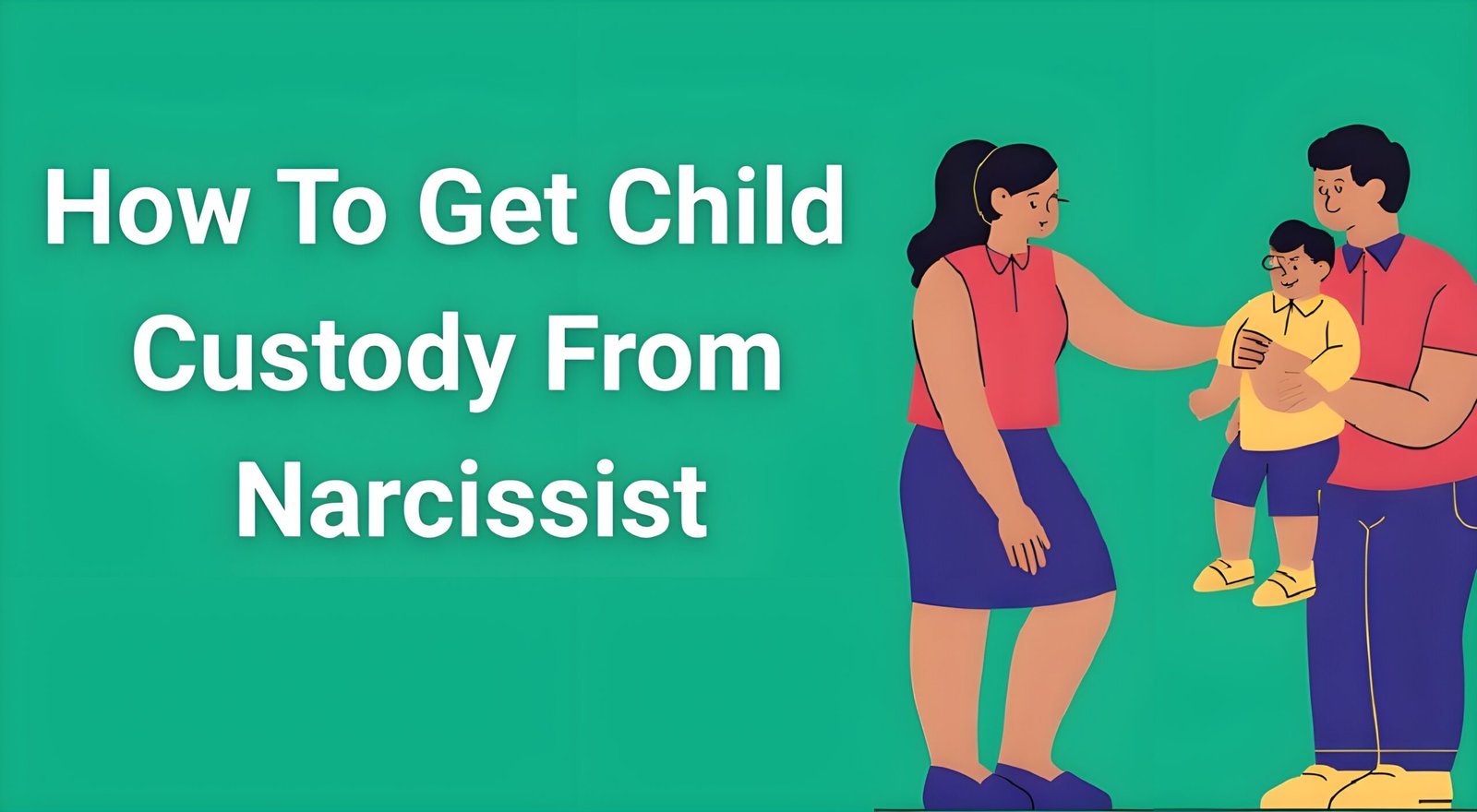When you’re trying to figure out how to get child custody from narcissist, you’re facing one of the most challenging legal battles imaginable. Narcissistic parents don’t just fight for custody – they weaponize the entire process, turning what should be about your child’s best interests into a psychological warfare campaign designed to maintain control over you and your children.
- Understanding the Narcissistic Parent in Custody Battles
- Strategy 1: Document Everything Systematically
- Strategy 2: Secure Professional Mental Health Evaluations
- Strategy 3: Build a Strong Legal Strategy with Experienced Counsel
- Strategy 4: Gather Compelling Evidence of Unfit Parenting
- Strategy 5: Protect Your Children’s Emotional Well-being
- Strategy 6: Master Strategic Communication Techniques
- Strategy 7: Prepare for Common Narcissistic Court Tactics
- Creating Your Comprehensive Protection Plan
- The Importance of Professional Guidance
- Frequently Asked Questions
- Conclusion
The stakes couldn’t be higher. Every decision you make, every piece of evidence you gather, and every strategy you employ can determine whether your child grows up protected in your care or subjected to years of manipulation and emotional abuse. Understanding how to navigate a custody battle with a narcissistic parent isn’t just about winning in court – it’s about safeguarding your child’s emotional and psychological well-being for years to come.
Understanding the Narcissistic Parent in Custody Battles
Before diving into strategies for how to get child custody from narcissist, it’s crucial to understand what you’re up against. Narcissistic parents view custody battles as opportunities to continue exerting control rather than genuine concern for their child’s welfare. They see children as extensions of themselves, valuable primarily for what they can provide: narcissistic supply, control over the other parent, and a positive public image.
During custody proceedings, narcissistic parents typically employ several manipulative tactics. They present themselves as the victim while painting you as unstable, unfit, or abusive. They’re masters at public persona management, appearing charming and reasonable to judges, attorneys, and court personnel while maintaining their abusive behavior behind closed doors.
The challenge becomes even more complex because family courts operate on the presumption that both parents should have access to their children unless proven otherwise. This means you can’t simply tell a judge your ex is a narcissist and expect immediate sole custody. You need concrete evidence, strategic planning, and often professional support to protect your children effectively.
Strategy 1: Document Everything Systematically
The foundation of learning how to get child custody from narcissist lies in comprehensive documentation. Narcissistic parents are skilled at gaslighting and creating false narratives, making your detailed records crucial for establishing truth in court.
Start documenting immediately and consistently. Keep a detailed journal of all interactions with your narcissistic co-parent, including dates, times, witnesses present, and exact conversations. Record instances of manipulative behavior, missed visitations, inappropriate communication, and any concerning behavior around your children.
Save all text messages, emails, and voicemails. Don’t delete anything, even messages that seem innocuous at first glance. Narcissists often reveal their true nature through patterns of communication that become apparent when viewed collectively. Screenshots should include timestamps and phone numbers clearly visible.
Document your child’s behavior and statements after spending time with the narcissistic parent. Note any regression in behavior, anxiety, fear, or concerning statements your child makes. While you should never coach your child or ask leading questions, paying attention to natural conversations and behavioral changes can provide important insights.
Create a comprehensive record of your own positive parenting. Document school involvement, medical appointments you attend, extracurricular activities you support, and daily care you provide. This positive documentation helps counter any false accusations the narcissistic parent might make about your parenting abilities.
Strategy 2: Secure Professional Mental Health Evaluations
Professional evaluations can be game-changing when determining how to get child custody from narcissist. These assessments provide objective, expert opinions about parenting capabilities and psychological fitness that carry significant weight in family court.
Request a custody evaluation or parenting assessment through the court. While these evaluations can be expensive and time-consuming, they often reveal the true nature of narcissistic behavior that might otherwise be hidden from the court. Trained professionals can identify manipulation tactics, lack of empathy, and concerning parenting patterns that may not be obvious during brief court appearances.
Consider requesting a psychological evaluation specifically for your ex-partner if you have substantial evidence of concerning behavior. Courts may order these evaluations when there are legitimate concerns about a parent’s psychological fitness. However, be prepared for potential retaliation, as narcissistic individuals often react poorly to having their mental health questioned.
Ensure your children have access to their own therapist or counselor. Not only does this support their emotional well-being during a difficult time, but trained mental health professionals can identify signs of manipulation or emotional abuse. Their professional observations and recommendations can be valuable in custody proceedings, though they should never be pressured to become advocates in your case.
Work with professionals who understand narcissistic abuse and high-conflict custody situations. Not all mental health professionals have experience with narcissistic behavior patterns, so seek out those who specialize in these areas for the most effective support and evaluation.
Strategy 3: Build a Strong Legal Strategy with Experienced Counsel
Learning how to get child custody from narcissist requires legal expertise specifically trained in high-conflict cases. Not all family attorneys have experience dealing with narcissistic personalities, and choosing the wrong legal representation can significantly impact your case outcome.
Research attorneys who specialize in high-conflict divorce and custody cases. Look for lawyers who specifically mention experience with narcissistic abuse or personality disorders in their practice descriptions. During consultations, ask directly about their experience with similar cases and their strategies for dealing with manipulative co-parents.
Prepare your attorney for what they’ll face. Narcissistic parents often try to charm legal professionals while simultaneously undermining their ex-partner’s credibility. Brief your attorney about expected behavior patterns and manipulation tactics so they can recognize and counter these strategies effectively.
Develop a comprehensive legal strategy that anticipates narcissistic tactics. This includes preparing for false accusations, character assassination attempts, and manipulation of evidence. Your attorney should help you gather evidence strategically and present your case in a way that highlights the narcissistic parent’s concerning behavior without appearing vindictive.
Consider requesting specific protective measures through the court. This might include supervised visitation if there are safety concerns, specific communication protocols to reduce conflict, or detailed parenting plans that limit opportunities for manipulation and control.
Strategy 4: Gather Compelling Evidence of Unfit Parenting
Evidence collection is perhaps the most critical aspect of how to get child custody from narcissist. Courts make decisions based on facts and evidence, not accusations or suspicions, making your documentation and proof essential for success.
Collect evidence of neglectful or harmful behavior toward your children. This includes missed school events, failure to attend medical appointments, inappropriate discipline, exposure to harmful situations, or failure to meet basic needs during their parenting time. Document patterns rather than isolated incidents to demonstrate ongoing concerns.
Gather witness statements from individuals who have observed concerning behavior. Teachers, coaches, family members, neighbors, and family friends can provide valuable testimony about what they’ve witnessed. Written statements should be detailed, factual, and include specific dates and circumstances when possible.
Document violations of existing court orders or agreements. If your co-parent consistently violates custody schedules, communication agreements, or other court-ordered requirements, maintain detailed records of each violation. This demonstrates a pattern of disregard for court authority and legal obligations.
Collect evidence of substance abuse, financial instability, or criminal behavior if relevant. While you should never invade privacy or break laws to gather evidence, public records, social media posts, and witnessed behavior can provide important information about a parent’s fitness and stability.
Be cautious about evidence gathering methods to ensure everything you collect will be admissible in court. Work with your attorney to understand proper procedures and avoid any actions that could be viewed as harassment or stalking.
Strategy 5: Protect Your Children’s Emotional Well-being
While fighting for custody, protecting your children’s immediate emotional and psychological well-being is crucial. The stress of custody battles combined with manipulation from a narcissistic parent can have lasting effects on children’s mental health and development.
Maintain stability and routine in your home environment. Children need predictability and security during uncertain times. Consistent bedtimes, meal schedules, and household rules help create a sense of safety and normalcy that contrasts with potential chaos in the other household.
Never speak negatively about the other parent in front of your children, regardless of their behavior. This can be incredibly difficult when you’re witnessing your child’s distress after spending time with the narcissistic parent, but maintaining your role as the stable, supportive parent is essential for both your child’s well-being and your custody case.
Provide emotional support without prying for information about their time with the other parent. Let your children know they can talk to you about anything, but avoid asking leading questions or pumping them for information about their other parent’s household. This protects them from feeling caught in the middle while still keeping communication open.
Consider therapy or counseling for your children with a professional who understands high-conflict custody situations. This provides them with a safe space to process their emotions and experiences while also creating a professional record of any concerning behaviors or statements that emerge naturally during sessions.
Work on building your child’s emotional resilience and self-esteem. Narcissistic parents often undermine children’s confidence and sense of self-worth. Counter this by providing consistent love, validation, and support that helps your child develop a strong sense of identity independent of the narcissistic parent’s approval or disapproval.
Strategy 6: Master Strategic Communication Techniques
Communication with a narcissistic co-parent requires specific strategies to minimize conflict while protecting yourself and gathering evidence. How you communicate can significantly impact both your custody case and your daily stress levels.
Implement structured communication protocols that limit opportunities for manipulation and abuse. Use email or co-parenting apps instead of phone calls or text messages whenever possible. These platforms create automatic records of all communication and allow you to think carefully about your responses before sending them.
Practice Gray Rock communication techniques during necessary interactions. Provide only essential information in brief, factual responses without emotional content. Avoid sharing personal information, feelings, or details about your life that could be used against you later.
Never engage in arguments or defend yourself against false accusations in writing. Narcissistic parents often try to provoke emotional responses that can be used as evidence of instability. Instead, stick to facts and redirect conversations back to child-related matters when they attempt to create drama.
Document all communication attempts and responses. Keep records of when you send messages, when they’re read (if visible), and response times. Note when the narcissistic parent fails to respond to important child-related communications, as this can demonstrate their lack of prioritization of the children’s needs.
Set clear boundaries about communication topics and timing. Establish that you’ll only discuss matters directly related to the children’s welfare and that emergency communication should be reserved for true emergencies. This helps reduce the narcissistic parent’s ability to use communication as a form of ongoing harassment.
Strategy 7: Prepare for Common Narcissistic Court Tactics
Understanding and preparing for typical narcissistic behavior in court settings is essential for how to get child custody from narcissist successfully. Narcissistic parents often employ predictable tactics that can be countered with proper preparation.
Expect false accusations and character assassination attempts. Narcissistic parents frequently accuse the protective parent of exactly what they themselves are doing – a psychological phenomenon called projection. Prepare evidence that counters these likely accusations before they’re made.
Anticipate charm campaigns directed at court personnel. Narcissistic individuals are often skilled at making positive first impressions with judges, attorneys, and other professionals. Prepare your legal team for this behavior and focus on presenting factual evidence rather than relying solely on character assessments.
Prepare for manipulation of children’s preferences or statements. Narcissistic parents may coach children about what to say in court or manipulate them into expressing preferences that don’t reflect their true feelings. Document any concerning changes in your child’s behavior or statements that might indicate coaching or manipulation.
Expect attempts to portray themselves as the victim while painting you as the aggressor. Narcissistic parents excel at reversing victim and offender roles. Maintain detailed documentation that demonstrates the true pattern of behavior and avoid any actions that could be misinterpreted as aggressive or retaliatory.
Be prepared for escalation and increased manipulation tactics as the case progresses. Narcissistic individuals often intensify their behavior when they feel their control is threatened. Anticipate increased harassment, false allegations, or attempts to involve third parties in the conflict.
Creating Your Comprehensive Protection Plan
Successfully learning how to get child custody from narcissist requires more than individual strategies – it demands a comprehensive protection plan that addresses legal, emotional, and practical considerations.
Your protection plan should include immediate safety measures for both you and your children. This might involve security systems, documenting threatening behavior, and having emergency plans in place if the narcissistic parent escalates their behavior during the custody process.
Develop a support network of professionals and trusted individuals who understand your situation. This includes your attorney, mental health professionals, trusted family members or friends, and potentially support groups for people dealing with narcissistic abuse. Having multiple sources of support helps you maintain perspective and emotional stability during challenging times.
Create financial protection by securing your own resources and documenting any financial abuse or manipulation. Narcissistic parents often use financial control as a weapon, so establishing your financial independence and protecting your assets is crucial for long-term success.
Plan for the long-term co-parenting relationship, even if you win primary custody. Unless you achieve sole custody with no visitation, you’ll likely need to continue dealing with the narcissistic parent in some capacity. Developing strategies for parallel parenting and maintaining boundaries will be essential for ongoing protection.
The Importance of Professional Guidance
While these strategies provide a foundation for how to get child custody from narcissist, each situation is unique and requires personalized guidance. The complexity of narcissistic abuse combined with the high stakes of child custody makes professional support essential.
Understanding the specific type of narcissistic behavior you’re dealing with can significantly impact your strategy. Different narcissistic presentations require different approaches, and what works against one type of narcissistic parent might be ineffective or even counterproductive against another.
If you’re struggling to understand exactly what you’re dealing with or need clarity about your specific situation, a Narcissistic Abuse Clarity Report can provide expert analysis of your circumstances. This personalized assessment helps you understand the specific manipulation tactics being used against you and your children, along with tailored strategies for your unique situation.
The emotional toll of custody battles with narcissistic parents cannot be underestimated. Many protective parents find themselves trauma bonded to their abusive ex-partner, making it difficult to think clearly and act in their best interests. Breaking free from these psychological chains is often necessary before you can effectively fight for custody.
The 30 Day Trauma Bond Recovery Workbook offers a science-based approach to breaking the addiction-like hold that narcissistic relationships create. This systematic program helps you regain clarity and emotional strength, essential tools for successfully navigating custody proceedings.
For parents who cannot immediately leave their situation or are waiting for custody proceedings to conclude, survival strategies become crucial. Learning how to protect yourself and your children while still in close contact with a narcissistic parent requires specific skills and techniques that can minimize harm until you can achieve safety through the legal system.
Frequently Asked Questions
Q: Can I get sole custody just because my ex is a narcissist?
A: Simply being a narcissist isn’t grounds for losing custody. You need to document specific behaviors that demonstrate harm to your children or inability to parent effectively. Courts focus on actions and their impact on children rather than personality disorders alone.
Q: How long do custody battles with narcissists typically take?
A: High-conflict custody cases can take anywhere from several months to several years, depending on the complexity of issues, court schedules, and the level of conflict. Narcissistic parents often prolong proceedings through various tactics, so patience and persistence are essential.
Q: Should I tell my children their other parent is a narcissist?
A: No. Children should never be burdened with adult psychological concepts or asked to take sides against a parent. Focus on providing emotional support, stability, and age-appropriate guidance about healthy relationships without labeling or criticizing the other parent.
Q: What if the narcissistic parent has more money for legal fees?
A: While financial resources can provide advantages, they don’t guarantee outcomes. Focus on thorough documentation, strategic evidence gathering, and working with attorneys experienced in high-conflict cases. Some courts also provide resources for parents with limited financial means.
Q: Can supervised visitation be ordered for narcissistic parents?
A: Supervised visitation can be ordered when there’s evidence of harm to children, but courts need specific reasons beyond personality traits. Document concerning behaviors, safety issues, or emotional harm to build a case for supervision requirements.
Q: How do I protect my children’s privacy during custody proceedings?
A: Work with your attorney to request confidentiality measures, avoid discussing case details in front of children, and be careful about social media posts. Focus on creating stability in your home environment while legal proceedings continue.
Conclusion
Learning how to get child custody from narcissist is one of the most challenging battles a parent can face, but it’s also one of the most important. Your children’s future emotional health, psychological development, and overall well-being depend on your ability to navigate this complex process successfully.
Remember that this battle requires both legal strategy and emotional strength. The narcissistic parent will likely employ every manipulation tactic in their arsenal to maintain control, but with proper preparation, professional support, and unwavering focus on your children’s best interests, protection is possible.
The seven strategies outlined here provide a roadmap for building a strong custody case, but each situation requires personalized approach and professional guidance. Don’t attempt to navigate this complex process alone – the stakes are too high and the challenges too significant.
Your children deserve to grow up in an environment free from manipulation, emotional abuse, and psychological harm. By taking action now, documenting systematically, and working with professionals who understand narcissistic abuse, you’re giving them the greatest gift possible: the chance to develop into healthy, confident individuals who understand what real love and respect look like.
The road ahead may be difficult, but remember that every step you take toward protecting your children is a step toward breaking the cycle of abuse and creating a healthier future for your family.






